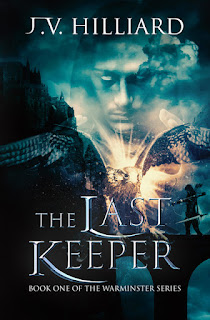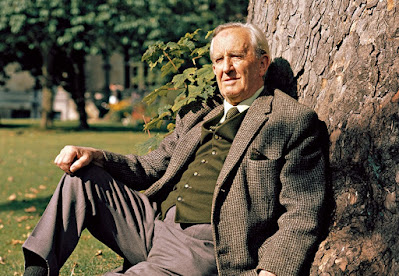The crimson-eyed captain has changed course. The red ship draws nearer.
A fantasy author is just another name for one who has a foot within the borders of Faerie
Hall of Fantasy
- Home
- The Spirit of Tolkien
- Types of Fantasy
- The Nine Magics
- Faerie
- I am Ian E.S. Adler
- The Bookshelf
- Hidden Gems
- Fantasy Book Tiers
- R.I.P.
- Quotes
- Song Triad
- Riddle Mastery
- Heroine Archetypes
- Champions of Light
- The Role & Proper Usage of Magic Thingamajigs
- GRRM the Anti-Tolkien
- Rumors of the Wheel
- Race in Fantasy
- Here Be Dragons
- The Power of Names
- LGBTQIA+ in Fantasy
- The History (& Golden Age) of Fantasy
- Artist vs. the Art
- Magic vs. Mental Illness
- How to make your own System of Magic
- The Final Lesson
- Golden Sun
- My book (The Cynnahu Saga)
- Contact Me?
- AI's impact on Fantasy Art & Writing
- Misc
Sunday, March 27, 2022
Sunday, March 20, 2022
BBC's Tolkien in Oxford (1968)
Striking gold is nice, but I much prefer mithril and I just hit a mine that has apparently been hidden in plain sight from my gaze for years. To cut a long story short, Tolkien in Oxford is the title of a 1968 BBC television documentary in which John Ezard has the incredible privilege of meeting and interviewing J.R.R. Tolkien as well as walking with him through Oxford, seeing the places he loves and hearing his own views regarding The Hobbit and The Lord of the Rings coupled with his love of the nature and beer. And let me tell you that Tolkien's charm and humor, humility and deep intelligence shines through like the Star of Eärendil! Aiya Tolkien elenion ancalima!
Saturday, March 12, 2022
Quote of the month
"When your fight has purpose – to free you from something, to interfere on
the behalf of an innocent – it has a hope of finality. When the fight is
about unraveling – when it is about your name, the places to which your
blood is anchored, the attachment of your name to some landmark or
event – there is nothing but hate, and the long, slow progression of
people who feed on it and are fed it, meticulously, by the ones who come
before them. Then the fight is endless, and comes in waves and waves,
but always retains its capacity to surprise those who hope against it."
- Téa Obreht
Monday, March 7, 2022
I just started Terciel and Elinor by Garth Nix
Sunday, March 6, 2022
Official Book Review: The Last Keeper, Book One of J.V. Hilliard's Warminster Series
I just finished The Last Keeper, Book One of J.V. Hilliard's Warminster Series and, as the author requested, now give it an Official Book Review.
At heart and beyond the various sub-genres there exists but three types of Fantasy: quality Fantasy, unique Fantasy, and quality unique Fantasy. Which is The Last Keeper? Beyond all question the third. As I stated when starting the book, despite blind seers and Elven Princesses being not uncommon in Fantasy games and world mythology, Fantasy literature seldom employs them and I have never seen them used jointly. Yet not only does J.V. Hilliard employ them with all the deftness of a skilled juggler, they are but two strands in the marvelously deep realm of Warminster he has woven from the auguries of the mythosphere.
“Crimson flags borne on horses of white, see them ride, ye children of light." – The Ballad of Eldwal

“The blade of betrayal, the sharpest of weapons, is wielded not by your enemies, but by your friends." – Warminster the Mage
A madman whose plan is just beginning and may only be stopped by the odd alliance between Princess
Addilyn, Last Keeper Daemus Alaric, trollborn Sir Ritter Valkeneer,
and, should true justice prevail, a pair from House Dauldon. Cultures separates them, custom would keep some apart, yet the world depends on them. May the Ancients and the light of Erud guide you, my friends, until book two of this most excellent debut series comes out. A book I shall most definitely read for, while I naturally would not rank Hilliard's skill as matching that of J.R.R. Tolkien, the Warminster Series carries on the same high tradition of skill, wonder, and escapism which The Lord of the Rings began.
(P.S. If you, dear reader, are an author/publisher and reading this review makes you want to ask me for a review too then PLEASE read my Contact Me? page.)
Tuesday, March 1, 2022
J.R.R. Tolkien's most hated fans
I know that I try to avoid all real-world matters here on Stars Uncounted, but this just too good as, once again, it captures the morality and keen-tongued insight of the Founder and Father of Modern Fantasy. J.R.R. Tolkien often had mixed feelings about his fans and how they regarded him and The Hobbit & The Lord of the Rings because in his mind, and truthfully, he was an acclaimed scholar first and High Fantasy author second while his fans viewed it the reverse. Furthermore, Tolkien himself saw his masterwork through a scholarly lens and thus felt many even of his deepest fan did not truly appreciate or understand his grand epic. Yet there was one particular group of fans he was of one mind about, those being the Nazis who were of course obsessed far and away well beyond the point of absolute madness with ancient Germanic and northern European cultures, meaning that Tolkien's academic writings on Old Norse and Germanic history, language, and culture were unsurprisingly loved by the Nazi elite. A fact Tolkien did not take philosophically, viewing the Nazis in much the same way Gandalf did Saruman, betrayers of the most loathsome order, and made no bones about keeping his utter contempt for them a secret. Tis something of an irony that the fans he most justifiably hated were also the ones most fixated on his scholarship as opposed to Fantasy, and I have already written about how he wrote a letter that is the flawless embodiment of eloquent scorn when his German publisher, in accordance with Nazi law, asked him to certify that he was an "Aryan" so as to publish The Hobbit (and Tolkien, in wrath, nearly forbade a German translation). But I recently came across a passage he wrote in a letter to his son Michael that, in my mind, perfectly captures his feelings towards Hitler and the intellectual treachery of the Nazis against the very thing they claimed to hold most dear. It is as follows:
"I have in this War a burning private grudge—which would probably make me a better soldier at 49 than I was at 22: against that ruddy little ignoramus Adolf Hitler ... Ruining, perverting, misapplying, and making for ever accursed, that noble northern spirit, a supreme contribution to Europe, which I have ever loved, and tried to present in its true light."
Hitler has been called many things by history and I have always employed the phrase "genocidal maniac" to describe him since calling him "the most evil man in history" just does not seem to capture the full scope of his unforgivable crimes and irredeemable madness. Yet, as usual, I have to say that J.R.R. Tolkien hit the nail on the head. My own "genocidal maniac" captures the lunatic's deeds, but "ruddy little ignoramus" captures the soul, or lack thereof in this case, of the man behind the maniac. A small man and failed art student utterly ignorant of history and trying with all his might to be big who had he not risen to power would surely have spent his life as contemptible malcontent spewing conspiracy theories to the dregs of society in which he himself was confined. I also find "ruddy little ignoramus" funny since Hitler is of course typically described in starker, darker, terms, but then my sense of humor has always been rather dry and was itself in many ways shaped by The Hobbit & The Lord of the Rings. Also, please remember that Tolkien wrote this in 1941, during World War II but before the details of the Holocaust, or the fact of it itself, was known. So naturally Tolkien, a scholar to the core, would be furious at Hitler for the misappropriation of Nordic religion and culture. A scholar who knew well the horror of the First World War, recalling that "in those days chaps joined up, or were scorned publicly. It was a nasty cleft to be in for a young man with too much imagination and little physical courage." But he did join, later writing that "Junior officers were being killed off, a dozen a minute. Parting from my wife then ... it was like a death."
"One
has indeed personally to come under the shadow of war to feel fully its
oppression; but as the years go by it seems now often forgotten that to be caught in youth by 1914
was no less hideous an experience than to be involved in 1939 and the
following years. By 1918 all but one of my close friends were dead." - J.R.R. Tolkien



